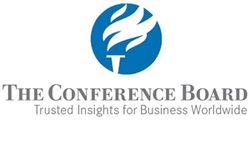 Recently, at the invitation of The Conference Board *, I had the opportunity to attend their 2010 Executive Coaching Conference in New York City. As an Executive Coach, I was thrilled to be able to attend this event and learn from some leading coaches and global organizations about best practices and current trends. Today’s post is the first in a series where I’ll share some of my experiences, takeaways and observations from the conference.
Recently, at the invitation of The Conference Board *, I had the opportunity to attend their 2010 Executive Coaching Conference in New York City. As an Executive Coach, I was thrilled to be able to attend this event and learn from some leading coaches and global organizations about best practices and current trends. Today’s post is the first in a series where I’ll share some of my experiences, takeaways and observations from the conference.
Below is an overview of my experience at the Executive Coaching Conference via take-aways and quotes from the speakers that I shared on Twitter using the hashtag #tcbcoaching. (Also included are some tweets from fellow conference blogger Barry Zweibel of GottaGettaCoach! Incorporated). During the conference, there were a number of great points made about internal & external coaches, measuring ROI of coaching and some interesting potential future applications were discussed (texting & Second Life).
Please forgive the abbreviations and shortened words in some tweets due to the 140 character limit!
Conference Keynote (Marshall Goldsmith – Author & Executive Educator)
- Check out @coachgoldsmith‘s new book at www.MojotheBook.com – came out this past Tuesday.
- Tons of FREE resources for Coaches and Leaders at http://marshallgoldsmithlibrary.com
- Good job interview question @coachgoldsmith recommends: “Do you love what you do?
- Best coaching advice: Imagine you’re dying & you have the ability to go back & talk to yourself. What advice would you have?
Peak Personal Performance Session
- 4 sources of energy – all critically important: Purpose (direction) Physical (quantity) Emotional (quality) Mental (focus)
- “Strategic disengagement” – new way to say “take some rest”.
- There are 20,000 moments in every day where you can make a difference. Are you an Eeyore or a Tigger?
- Research shows that having an “attitude of gratitude” can add 5 years to your life.
- “The only difference between a rut and a grave are the dimensions.” Important to keep moving forward and stay sharp.
- Powerful things: 1) Craft a Purpose Statement 2) Get clear on Ur Top 5 Roles in Life 3) Define 100 Things U Want to Do in Life
- 80% of heart attack victims never change their behavior. 20% that do? They have someone who holds them accountable for change.
- It takes 21 days to establish a new habit. Invest extraordinary energy in it during that time & build in accountability.
Keynote: The Role of Virtual Coaching – Pros and Cons
- “No correlation between fees that are charged and the Quality of coaching you get”
- So true: “If you know where the conversation is going… It’s not Coaching”
- “Really good coach helps redefine a clients goals” (via @ggci)
- “The more detail you put into a definition, the less meaningful it likely is” (via @ggci)
- Most coaches are under qualified – even those chosen by the executive (via @ggci)
- “To be an effective telephone-based coach, you need to first be a good in-person and via-email coach” (via @ggci)
- Case study done on an instance of Coaching by text. Hmmm… does it make me old-fashioned if I don’t think that’ll work?
- Levels of coaching – skills, performance, behavioral, transformational (via @ggci)
- Clutterbuck suggests not dismissing Second Life in terms of coaching either.
- A broad sense of purpose has a higher correlation to success than goals. Goals are an outcome of your Purpose.
- Important in Coach/Coachee relationship to have enough similarity to create rapport, but enough difference to create stretch
2009 Executive Coaching Practice Survey (results overview)
- Exec Coaching survey: In large orgs, most resp 4 coaching are managed centrally re: strategy. Local takes active role in matching
- Average length of coaching engagements (external coaches) – majority in 6 – 9 month range, very few lasting longer than 1 yr.
- Survey: Majority (50%) of large orgs work with external coaches who have 1 – 5 coaching engagements in their orgs per year.
- Survey: #1 reason for engaging an external coach – Development. 2nd 360 Debrief. 3rd Other assessment debrief. 4th Transition
- Survey: Majority of coaches (0ver 50%) are paid as services are rendered or monthly. Only 2.8% are paid at end of engagement.
- Survey: Internal coaching is on the rise and growing, but in its infancy. Internal coaches tend to be HR prof vs line leaders.
- Survey: Almost 80% of internal coaches spend less than 20% of their time on coaching activities.
- Discussion happening as to whether or not #HR is the right place for internal coaches due to trust/credibility issues. #sad
- “Line business leaders trained as coaches have double the credibility – because they know the business” #HRopportunity
How Coaching Is Being Used With High Potentials (Panel)
- Panelist: It’s more important for external Coaches to focus on gaining experience & strong reputation vs specific certification.
- At Amex, coaching evolving into high-touch, targeted investment closely linked to business results. (via @ggci)
- At NY Life, coaching is about culture change, and creating ‘distributed’ and ‘principles-based’ leadership (via @ggci)
- At Microsoft, coaching program “allows emerging and experienced leaders to learn from each other.” (via @ggci)
- At Microsoft, coaching dev plans include more observing/interacting w/senior leaders; building strong networks w/other hi-pos (via @ggci)
- At Amex, “coaching must leave a footprint in the organization that builds our internal capability” (via @ggci)
Identifying & Developing Coaching Competencies for Managers (Panel)
- Very cool job – panelist at #tcbcoaching = Coach at NASA. Challenge of getting highly technical folks to understand “art” of leadership
It’s a wrap!
- Finishing up at The Conference Board’s Executive Coaching Conference #tcbcoaching. Top notch event with sharp speakers/attendees. Good info!
* Disclosure: By accepting TCB’s invitation to attend, I’m asked only to help them get the word out about their events and the programs that they offer to leading organizations and senior executives. I’m free to share my opinions (positive or negative) about my experience in attending and comment on the content shared by the speakers at the conference.


